Campaign Resources (403 found)
State Terror in the Kachin Hills
In late 2012, the Burma Army intensified military operations against strongholds of the Kachin Independence Army (KIA). This culminated in a massive offensive on the KIA headquarters at Laiza on the China-Burma border starting in mid-December […]
• • •Developing Disparity: Regional Investment in Burma’s Borderlands
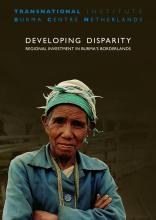 Unless foreign direct investment in Burma’s war-torn borderlands is refocused towards people-centered development, it is likely to deepen disparity between the region’s most neglected peoples and Burma’s new military, business and political elite and exacerbate a decades-long civil war.
Unless foreign direct investment in Burma’s war-torn borderlands is refocused towards people-centered development, it is likely to deepen disparity between the region’s most neglected peoples and Burma’s new military, business and political elite and exacerbate a decades-long civil war.
Burma has entered a pivotal stage in its political and economic development. The advent of a new quasi-civilian government has raised the prospect of fundamental reforms […]
Report of Evidence Regarding Controversies at Letpadaung Hill Copper Mine Project
Executive Summary This report was prepared by Lawyers Network, an independent association of leading lawyers throughout Myanmar, and Justice Trust, an international group that supports national efforts to advance rule of law and human rights. It concerns recent controversies at a Letpadaung copper mine, a joint venture between Wanbao Mining, a subsidiary of North China […]
• • •Danger Zone: Giant Chinese Industrial Zone Threatens Burma’s Arakan Coast
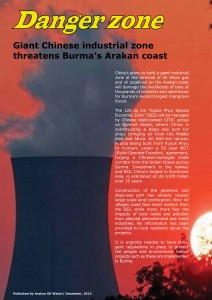 China’s plans to build a giant industrial zone at the terminal of its Shwe gas and oil pipelines on the Arakan coast will damage the livelihoods of tens of thousands of islanders and spell doom for Burma’s second largest mangrove forest. The 120 sq km “Kyauk Phyu Special Economic Zone” (SEZ) will be managed by Chinese state-owned CITIC group on Ramree island, where China is constructing a deep sea port for ships bringing oil from the Middle East and Africa […]
China’s plans to build a giant industrial zone at the terminal of its Shwe gas and oil pipelines on the Arakan coast will damage the livelihoods of tens of thousands of islanders and spell doom for Burma’s second largest mangrove forest. The 120 sq km “Kyauk Phyu Special Economic Zone” (SEZ) will be managed by Chinese state-owned CITIC group on Ramree island, where China is constructing a deep sea port for ships bringing oil from the Middle East and Africa […]
Excluded: Burma’s Ethnic Nationalities on the Margins of Development and Democracy
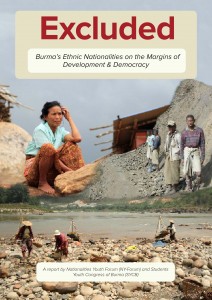 This report presents documented evidence that ethnic nationalities directly affected by development projects in Burma are systematically denied their right to free, prior, and informed consent (FPIC). While development related abuse has been well documented, no report has shed light on the staggering scale of the widespread denial of participation rights in Burma […]
This report presents documented evidence that ethnic nationalities directly affected by development projects in Burma are systematically denied their right to free, prior, and informed consent (FPIC). While development related abuse has been well documented, no report has shed light on the staggering scale of the widespread denial of participation rights in Burma […]
Lost Paradise: Damaging Impact of Mawchi Tin Mines in Burma’s Karenni State
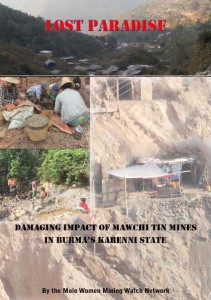 The Molo Women Mining Watch Network was formed by women from the Karenni Women’s Organization, Karenni Social Welfare and Development Centre and Karenni Evergreen Organization, who wanted to research information about the Mawchi tin mines. The network was named after the Molo Stream which flows from the Mawchi mines to the Salween River. It aims to work for women throughout our state who are facing social and environmental impacts of mining, and to empower them to solve these problems […]
The Molo Women Mining Watch Network was formed by women from the Karenni Women’s Organization, Karenni Social Welfare and Development Centre and Karenni Evergreen Organization, who wanted to research information about the Mawchi tin mines. The network was named after the Molo Stream which flows from the Mawchi mines to the Salween River. It aims to work for women throughout our state who are facing social and environmental impacts of mining, and to empower them to solve these problems […]
ASEAN Human Rights Declaration
The ASEAN Human Rights Declaration was adopted by ASEAN member states on 9 November 2012 in Phnom Penh, Cambodia […]
• • •2012 ANNI Report on the Performance and Establishment of National Human Rights Institutions in Asia
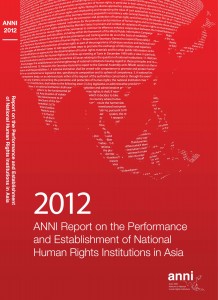 The past couple of years have seen an increasing international recognition of the role of NHRIs in the promotion and protection of human rights. A growing number of Asian countries have either recently established or are considering the establishment of NHRIs, including in Burma, where the Myanmar National Human Rights Commission (MNHRC) was set up in September 2011. Meanwhile the UN Human Rights Council on 16 June 2011 adopted a resolution on “National Institutions for the Promotion and Protection of Human Rights” – the first-ever Human Rights Council resolution to focus specifically on the work of NHRIs.
The past couple of years have seen an increasing international recognition of the role of NHRIs in the promotion and protection of human rights. A growing number of Asian countries have either recently established or are considering the establishment of NHRIs, including in Burma, where the Myanmar National Human Rights Commission (MNHRC) was set up in September 2011. Meanwhile the UN Human Rights Council on 16 June 2011 adopted a resolution on “National Institutions for the Promotion and Protection of Human Rights” – the first-ever Human Rights Council resolution to focus specifically on the work of NHRIs.
The resolution acknowledges the significant role of NHRIs in the promotion and protection of human rights at national level, as well as their important role in the Human Rights Council, and calls for further cooperation with regional coordinating bodies of NHRIs. These developments are set against the backdrop of a general deterioration in the situation of human rights in many countries in Asia. This can be seen, for example, in the adoption of various repressive laws such as national security laws […]
• • •Pipeline Nightmare
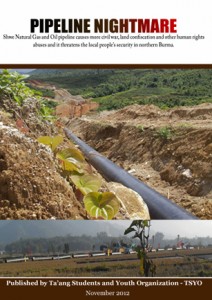 Shwe Pipeline Brings Land Confiscation, Militarization and Human Rights Violations to the Ta’ang People
Shwe Pipeline Brings Land Confiscation, Militarization and Human Rights Violations to the Ta’ang People
This report illustrates how the Shwe Gas and Oil Pipeline project, which will transport oil and gas across Burma to China, has resulted in the confiscation of people’s lands, forced labor, and increased military presence along the pipeline, affecting thousands of people […]
• • •The War in Kachin State: A Year of More Displacement and Human Rights Abuses
In the past year, the Tatmadaw has deployed nearly 25% of its battalions to Kachin State, escalating its war with the Kachin Independence Army (KIA) and bringing further suffering to civilian populations in Kachin State and Northern Shan State.
Tatmadaw soldiers have constantly targeted civilians in Kachin State and Northern Shan States as part of their military operations against the KIA. Human rights abuses have included extrajudicial killings, rape of women, arbitrary arrests, torture, forced displacement, the use of human shields, forced labor, and the confiscation and destruction of property. All of these systematic abuses would be considered war crimes and/or crimes against humanity under international law […]
• • •
 All posts
All posts